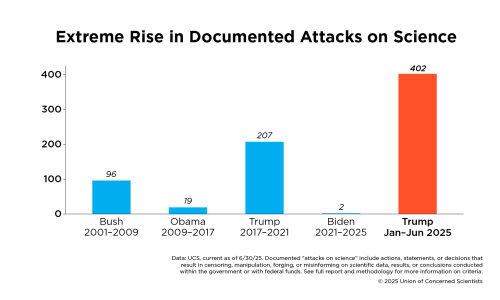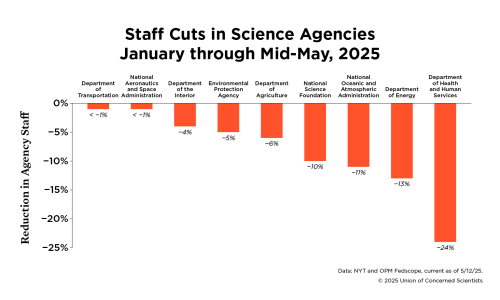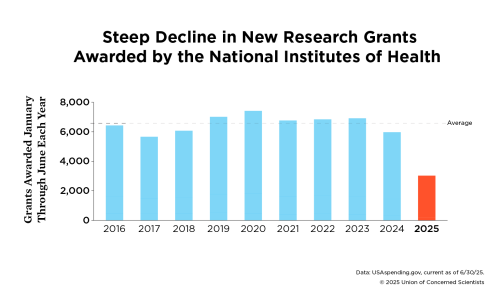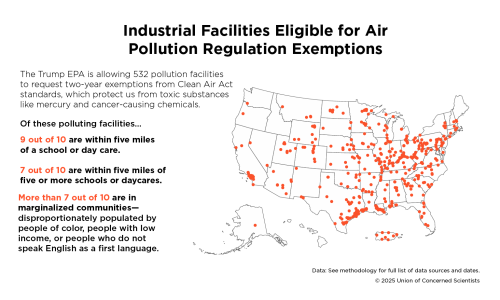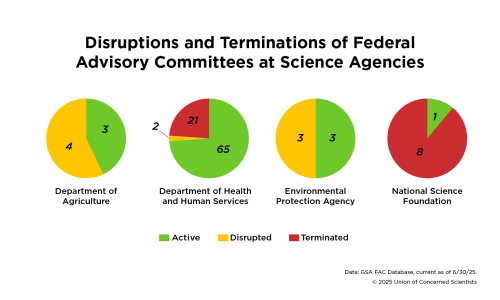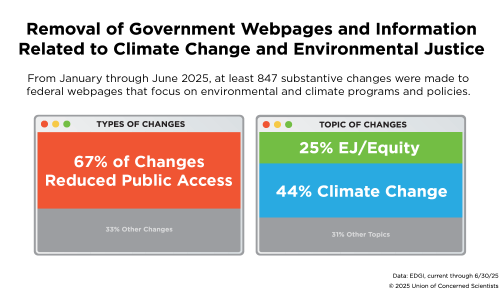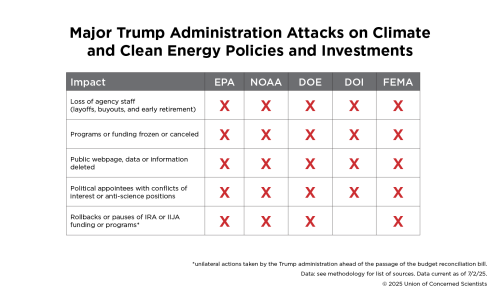The first six months of President Trump’s second term have been characterized by destruction of democratic processes, divisive and vindictive actions, and chaos in federal government agencies.
Since the Inauguration, the administration has systematically destroyed federal scientific systems. The Trump administration’s actions are not normal. This is an illegal power grab—a wholesale attack on the democratic systems upon which this nation was built.
Between January 20 and June 30 of this year, we documented 402 attacks on science. We define “attacks on science” as actions, statements, or decisions that originate from an elected official or political appointee in a federal agency that results in the censoring, manipulation, forging, or misinforming on scientific data, results, or conclusions conducted within the government or with federal funds.
When science is sidelined, people are harmed. In this report, we document the ways this administration has targeted the public science that we all depend on, and offer recommendations and resources to counter these attacks and hold the administration accountable.
Science and Democracy Under Siege
The first six months of President Donald J. Trump's second term have been characterized by destruction of democratic processes, divisive and vindictive actions, and chaos in federal government agencies. Within days of his inauguration, President Trump handed illegal authority to Elon Musk—an unelected billionaire—and the so-called Department of Government Efficiency (DOGE) to take over government agencies, access US people's private, protected data, and lock federal employees out of computer systems and lawmakers out of federal buildings. Within weeks, the administration shut down entire agencies; halted billions of dollars of funding to research, public health programs, and energy transition investments; and indiscriminately pushed hundreds of thousands of civil servants out of the federal workforce. Government employees have been harassed, have received threatening emails from DOGE, and have been terminated without notice.
The Trump administration's actions are not normal. This is an illegal power grab—a wholesale attack on the democratic systems upon which this nation was built. Since his second inauguration, President Trump has signed 168 executive orders attacking and dismantling our basic civil liberties, many mirroring priorities outlined in Project 2025, the right-wing policy agenda developed by the Heritage Foundation. With the stroke of a pen, the Trump administration has demonized diversity, equity, inclusion (DEI) and environmental justice; pushed widespread rollbacks of our nation's environmental and public health protections; attacked universities where cutting edge research occurs; and threatened civil society organizations and the press, among much more. And strikingly, the administration issued a misleading and insidious executive order that dismantles federal agency scientific integrity policies and purports to promote "transparency" and "reproducibility" that will actually undermine science in favor of political ideology in government decisionmaking.
The administration has also rapidly consolidated power in the executive branch of government, such as by illegally freezing federal spending, firing thousands of federal employees and contractors who carried out programs created by Congress, and defying various court orders, including those from the US Supreme Court. According to one count, as of July 2, there have been 325 legal challenges to the Trump administration's actions.
Federal government programs, including grants, designed to target and enhance participation among historically underserved communities—Black, Brown, Indigenous, non-English speaking, rural, and low-income communities—have been crudely eliminated. Hateful and inaccurate rhetoric and threats, especially toward transgender people and their health care, have escalated. And perhaps most chilling: the administration has begun illegally imprisoning and removing people with legal status in the United States, specifically non-White immigrants.
The Trump administration is operating as an authoritarian regime. And fundamental to the scheme: cutting out science and scientists that challenge their agenda. By ignoring high-quality evidence and facts, the Trump administration attempts to position itself as the arbiter of truth and reality.
In the past six months, the administration has systematically and recklessly destroyed federal scientific systems by:
-
slashing the federal workforce, including pushing out experts in federal agency leadership;
-
wiping out funding for critical scientific research within and outside the government;
-
cutting scientists and the public out of government decisionmaking processes;
-
silencing independent advisory committees;
-
and spreading disinformation, distorting scientific information, and halting government data collection; among more.
When science is sidelined, people are harmed. During President Trump's first term, the administration rolled back key public health and environmental protections, promoted anti-science policy, silenced government and independent scientists, and much more. Despite efforts to restore capacity and trust in science during the Biden administration, just six months into President Trump's second term the federal government has lost immeasurable expertise in programs that save people's lives. Already, unqualified appointees have threatened public trust in government agencies and scientists. For example, a recent poll showed that 44 percent of the US public say that as a result of new leadership in federal public health agencies, they will trust agency recommendations less. Even more, slashing federal funding to state health programs has starved prevention and response efforts to the worst measles outbreak in the United States in decades. With the gutting of the National Institute of Occupational Safety and Health, the agency was not responding to requests for health hazard evaluations for workplace safety from workers, unions, and companies. With workforce cuts at the National Weather Service, the agency that provides real-time weather alerts is less able to issue life-saving information that the public and first responders rely on during extreme weather events. And the US Environmental Protection Agency (EPA) is yielding to corporate polluters, systematically eliminating pollution regulations and enforcement, exposing millions of people, especially communities most overburdened by the cumulative impacts of environmental and social stressors, to harmful pollution such as cancer-causing toxic chemicals. Unfortunately, a compliant Congressional majority is rubber-stamping many of the excesses of the Trump administration and thus far refusing to stand up for the best interests of people in America. The full effects of these actions will not be known for months and perhaps years to come, but they are already harming the US public.
At the Union of Concerned Scientists (UCS), we are watchdogging these destructive actions, mobilizing scientists to oppose rollbacks of environmental and public health protections, suing the administration, and pushing government decisionmakers to protect their constituents. We are also documenting attacks on science to show how political interference in federally funded scientific processes—including in our country's higher education system—can endanger the health and safety of all of us and stymie valuable innovation.
Documenting Attacks on Science
UCS has tracked attacks on science in the federal government since the start of the first George W. Bush administration. To capture the breadth and ferocity of the Trump administration's current dismantling of science in the federal government, we updated our methodology for documenting attacks on science. To do so, we pulled from various sources of research, including previous UCS analysis.
Between January 20 and June 30, 2025 we documented 402 attacks on science. We define "attacks on science" as actions, statements, or decisions that originate from an elected official or political appointee in a federal agency that results in the censoring, manipulation, forging, or misinforming of scientific data, results, or conclusions conducted within the government or with federal funds.
During President Trump's second term, we observed attacks on science such as federal scientists being demoted or terminated; federal agencies halting data collection in scientific studies; efforts to censor scientists; regulatory actions, such as rule rollbacks, that ignore the best available science; and directives to minimize the accessibility of publicly available scientifically informed data, reports, or guidance. Some of the most common types of attacks on science that we have documented since January 20 include:
-
At least 39 instances of a federal agency enacting an anti-science decision; or rescinding, refusing to enforce, or delaying the finalization of an official decision that is based on science or scientific consensus. One example is the EPA's weakening of a rule to limit the quantity of PFAS, also known as "forever chemicals," in drinking water.
-
At least 33 instances of federal grants or funding being politicized—including when it is withheld, dictated, or eliminated with blatant political motivations—such as when federal agencies paused grant dissemination in line with President Trump's anti-DEI executive order.
-
At least 30 instances of federal scientists losing their positions, through either having their positions eliminated or being demoted and replaced by political loyalists, including massive staff losses at the EPA, Department of Health and Human Services (HHS), and National Oceanic and Atmospheric Administration (NOAA).
Scientists within and funded by the federal government have also been prevented from participating in professional engagement activities at least 10 times, including being barred from attending and presenting at conferences and canceling meetings of the panels that evaluate grant applications. However, the Trump administration's attacks on science span across various issues and agencies, showcasing a systematic and concerted effort to remove science from government decisions and policy.
We are seeing a marked increase in attacks on science between President Trump's first and second terms, although our methods for determining attacks on science have evolved to consider the heightened threats to science in this administration. To put these findings in context, as shown in Figure 1, our previous research documented 207 attacks on science during President Trump's first term (out of 326 total attacks documented since 2001). Already, just six months into his second term, the administration has carried out 94 percent more attacks on science than in his entire first term, demonstrating the sheer and unprecedented assault on our nation's scientific institutions and experts. Columbia University's Sabin Center for Climate Change Law has also been tracking government efforts to silence science and documented 352 during President Trump's first term, with 75 actions already nearly six months into his second term.
Altogether, the administration's actions have undermined the use of government science for public good. Below, we document five key ways the Trump administration is destroying our nation's democratic systems and, consequently, the federal scientific enterprise. We also propose recommendations and resources to enshrine the use of science in government decisionmaking, protect federal scientists, and hold agencies accountable to the US public—one of the core underpinnings of our democracy.
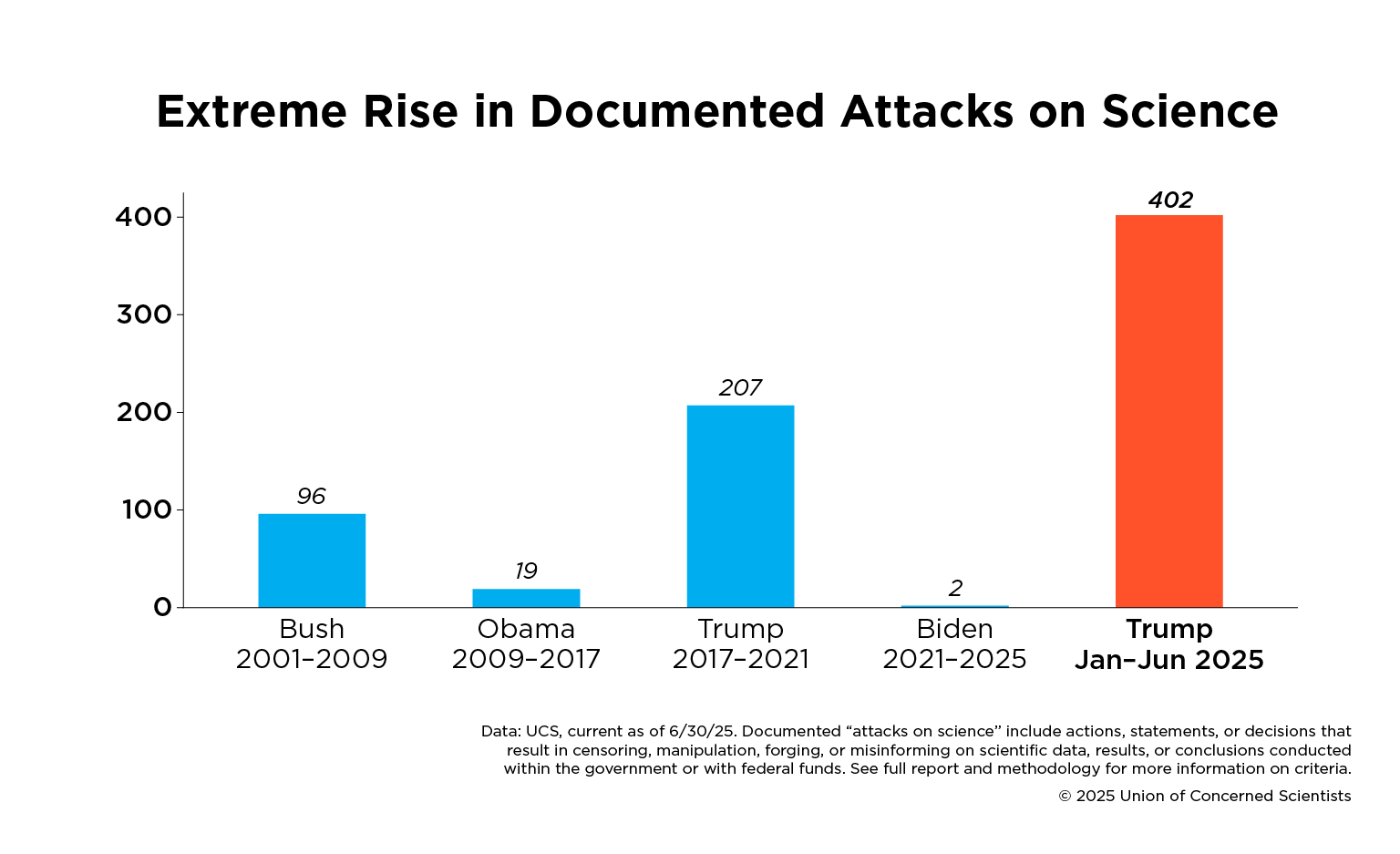
**Data source: See methodology.
Note: Methodology for determining attacks on science has been updated between the current and previous administrations. Data last updated on June 30, 2025.
Union of Concerned Scientists
How to Destroy Public Science That Keeps Us Safe—Lessons from the Second Trump Administration
1. Gutting Scientific Expertise
The Trump administration's second term has seen vast, disorderly reductions in the federal workforce, with more than 120,000 employees eliminated in the first 6 months of 2025. This unprecedented slashing—estimated to be nearly 7 times greater in the first quarter of 2025 compared to the same period in 2024—targets science-focused agencies through various methods such as mass firings of probationary employees, reassignments, reductions in force, and even retaliatory dismissals. Key science agencies have experienced significant staff cuts: the Department of Health and Human Services by 24 percent, the Department of Energy (DOE) by 13 percent, the National Oceanic and Atmospheric Administration by 11 percent, and the Environmental Protection Agency by 5 percent. A notable number of employees in these agencies are categorized as being in "scientific occupations," including nearly half of the employees in NOAA and EPA. These reductions have halted critical government programs, undermining the federal government's ability to provide essential protections, oversight, and science-based services to the US public, particularly harming disadvantaged communities.
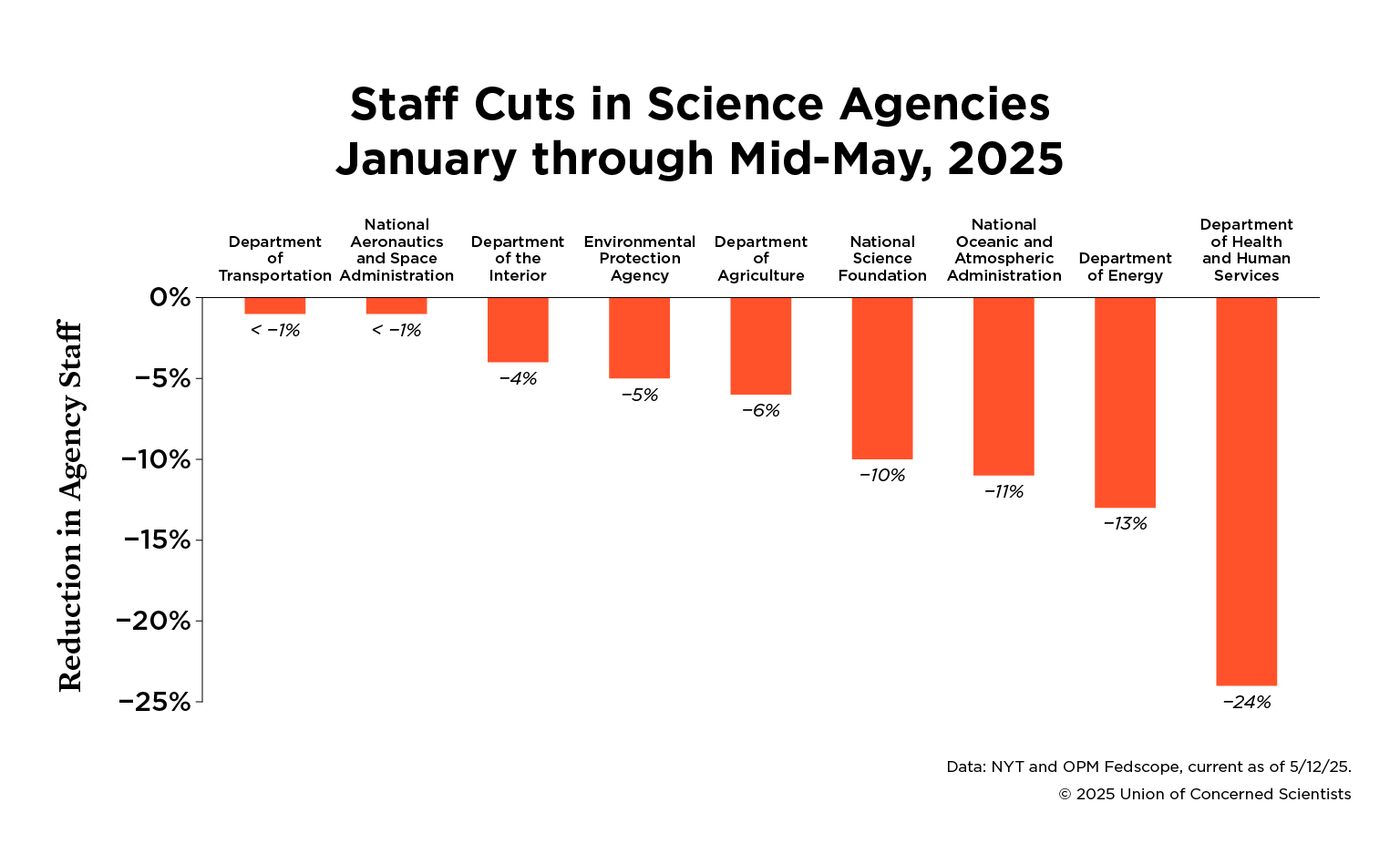
**Data sources: New York Times; Office of Personnel Management FedScope.
Data last updated on May 12, 2025.
Union of Concerned Scientists
Read More: Gutting Scientific Expertise
At the end of 2024, the federal government employed about 3 million people who provided crucial services, including issuing passports; ensuring clean drinking water, safe food, and healthy air; providing medical care to veterans; protecting workers; tracking disease rates; estimating population statistics; exploring and researching outer space; and developing curricula for students, among many other services. Ideally, these services are designed and implemented based on scientific evidence and public input.
It has been difficult to predict, or even follow, the impacts of the vast and disorderly reductions in the federal workforce that have occurred in the first six months of President Trump's second term. Over 120,000 federal employees were laid off or were targeted for layoffs, and there are estimates that federal employee layoffs in the first quarter of 2025 were nearly 7 times greater than the first quarter of 2024. The number of employees in the federal government fluctuates over time, including during turnover between presidents. However, this administration is targeting federal agencies that fund and conduct scientific studies with unprecedented firings and layoffs. Even considering contradictory court orders that hold federal jobs in the balance and staff being mistakenly fired, data indicate the government led all sectors in job cuts in the first quarter of 2025. The Trump administration has stopped federal workers from serving the US public in several ways: mass firing of probationary employees; reassigning them as political appointees under Schedule Policy/Career (formerly Schedule F); reduction in force (RIF) notices; shifting their responsibilities away from independent science; pressuring employees to accept buyouts or early retirements; putting staff on administrative leave; and dismissing those who are "disloyal" in alarming retaliatory actions.
As shown in Figure 2, nine science-focused federal agencies highlighted in our analysis experienced detrimental reductions in their workforce. The Trump administration has reduced HHS employees by 24 percent, DOE by 13 percent, NOAA by 11 percent, and EPA by 5 percent (this number will likely increase as a RIF takes place on July 31) since taking office.
The elimination of federal employees has left many government programs insufficiently staffed, bringing their efforts to a grinding halt. Cuts to both NOAA's workforce and funding have already resulted in disruptions and degradation in weather monitoring and climate modeling that keep the public aware of short-term hazards and inform long-term planning (see case study on the attacks on climate science). This has created immense uncertainty and inconsistency in the processes ensuring the protections, oversight, and science that the federal government is charged with providing. For example, with mass layoffs at HHS, the Centers for Disease Control and Prevention (CDC) lost the entire team tasked with investigating and preventing lead poisoning, which is extremely harmful to children. As a result, schools in Milwaukee, Wisconsin, closed due to concerns about lead exposure after being denied assistance from the CDC team that no longer existed (HHS claims that these staff have since been reinstated).
While we do not yet know how many scientists, specifically, were laid off, a notable number of employees at these agencies are categorized as having a "scientific occupation:" 49 percent of employees at NOAA, 45 percent at EPA, 21 percent at the US Department of Agriculture (USDA), 13 percent at HHS, and 10 percent at DOE. Among the 5 percent of employees laid off from EPA, many were lost from the Office of Environmental Justice and External Civil Rights (OEJECR), which coordinates environmental justice initiatives across the agency and provides technical assistance and grants across the country, as well as the Office of Research and Development, the agency's central research arm. Despite broad bipartisan support for this work, reduction in force notices were issued to those employees, in addition to threats to close the entire office. These cuts were part of broader efforts to eliminate environmental justice work across the federal government. OEJECR staff implemented critical work to address cumulative and disproportionate harms in communities across the country, including supporting work that brought updated water treatment systems to communities, abated lead, remediated brownfield sites, and developed web tools that pulled together data to understand the environmental burdens and stressors in communities. Without targeted efforts by offices like OEJECR to address and eliminate disproportionate pollution burdens, these disparities will persist and perhaps even increase over time.
2. Halting Science and Innovation
The Trump administration has ordered sweeping and unlawful cuts to US scientific research funding and programs, jeopardizing public health, the economy, and higher education. The National Institutes of Health (NIH), the largest funder of biomedical research in the world, has faced significant disruptions. As a result of these cuts, NIH awarded 54 percent fewer new project grants from January 1 to June 30, 2025 compared to the previous nine-year average, the fewest in a decade. Additionally, the administration rescinded 2,958 NIH grants perceived to relate to LGBTQ+ health, vaccine hesitancy, environmental justice, and DEI, among other topics. While court decisions may reverse some of these interruptions, the disruption of scientific grantmaking could have life-altering consequences on research related to critical health issues like cancer and autoimmune disorders.
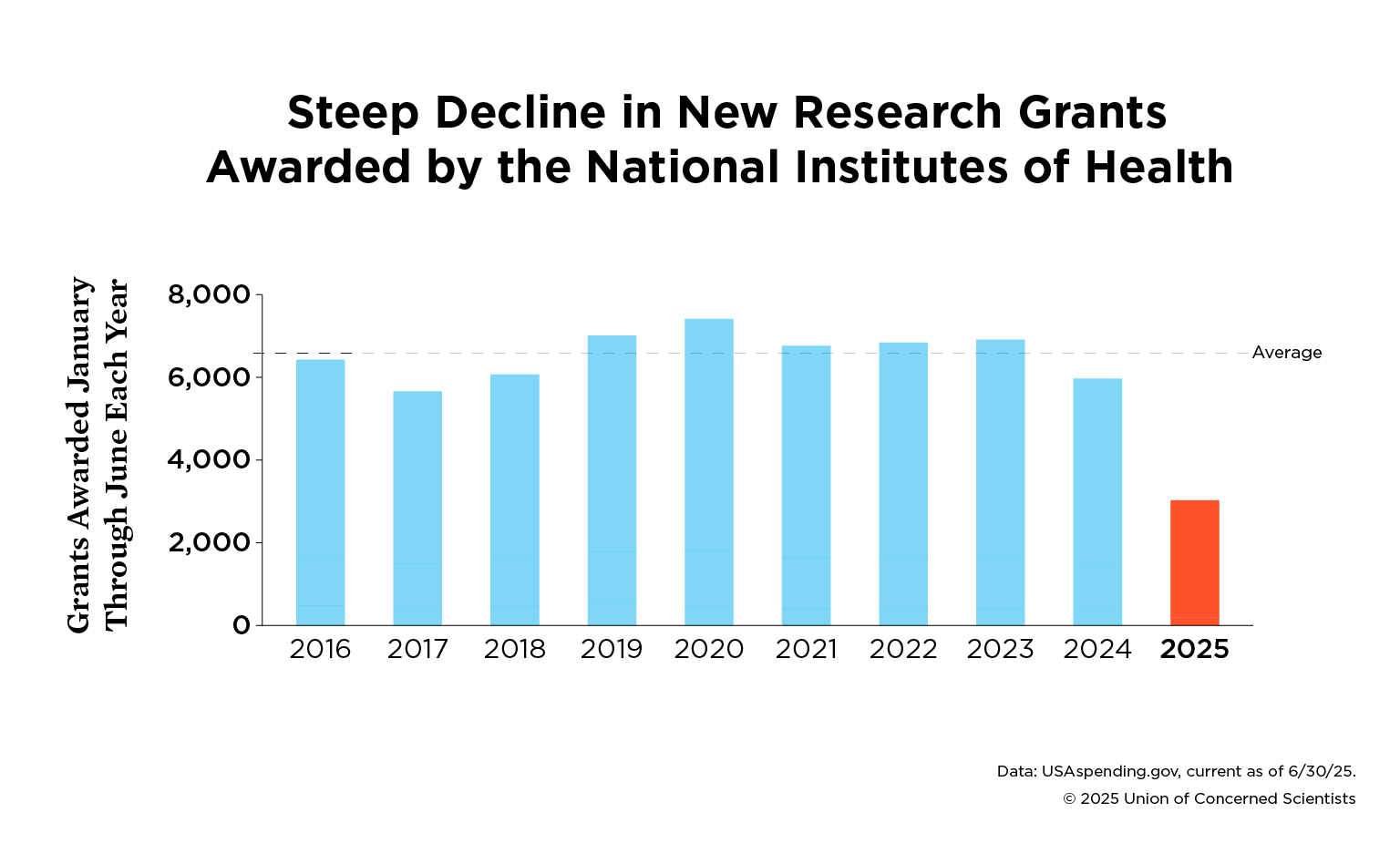
**Data source: USAspending.gov.
Note: The average number of new project grants awarded between 2016 and 2024 is indicated by the dashed line. Data last updated on June 30, 2025.
Read More: Halting Science and Innovation
For decades, the United States has been considered a science superpower, in part because of the large amount of research and innovation its federal government funded and facilitated. Since President Trump's return to the White House, scientific funding and capacity has been slashed, leading to a decrease in awarded grants and research activity and threatening the US economy, higher education institutions, and the livelihoods of those whose work is funded by federal monies. Before Inauguration Day, the National Institutes of Health (NIH) was the world's largest funder of biomedical research. Historically, NIH has funded innovative, life-saving research on a broad range of topics that has helped people across the world; much of this research is the kind of basic science that the biomedical industry typically does not fund but uses to create products. Research conducted within and funded by NIH has helped medical and public health professionals better understand, treat, and prevent infectious diseases such as HIV, tuberculosis, and COVID-19; illnesses such as cancer; and chronic diseases such as endometriosis. NIH funding is distributed across various sectors and fields, including academic institutions and researchers, medical institutions and hospitals, and other non- and for-profit organizations. Altogether, our understanding of science and medicine and, by extension, the scientific community's ability to treat and detect various health conditions would not be where it is today without NIH's scientists and funding.
NIH research, funding, and general operations have been in chaos since President Trump's return to the White House. The agency not only received a directive to halt all external communications from its parent agency, HHS, but the Trump administration also promptly ordered NIH to halt all grant review panels and travel related to NIH-funded research. Grant review panels facilitate expert review of grant applications to decide which projects and organizations receive the funds. Although the Trump administration rescinded a federal funding freeze two days after it was ordered due to public and judicial backlash, it did not allow NIH to schedule select grant review meetings until the end of February, with more receiving permission to meet at the beginning of April. This meant that the agency was not able to review grant applications, award grants, or disseminate funds to universities, businesses, and nonprofit organizations across the country for months. The Trump administration also illegally attempted to cap indirect costs (money allocated for non-research-related expenses such as electricity costs in laboratories) for NIH grants; a judge blocked this move, but the administration has indicated it plans to appeal. To add insult to injury, the NIH eliminated its scientific integrity policy, which helps combat political interference in federal agency science-based processes. A similar series of events has unfolded at the National Science Foundation (NSF), with grant funding being scrutinized and eventually eliminated for containing "taboo" words, science advisory panels being dismissed, and new funding being constrained by ideological values. The administration has also withdrawn the United States from the World Health Organization and prevented federal scientists from engaging in international collaboration, which will have measurable consequences for the health of the US public and the global community.
Using publicly available data from USAspending.gov, we estimate that NIH awarded an average of 6,563 new project grants per year across a nine-year period (from 2016 to 2024) during January to June. As shown in Figure 3, from January 1 to June 30, 2025, NIH awarded 3,029 project grants total. That is, NIH awarded 54 percent fewer grants during this time compared to the average number of awards over the preceding nine years. This is the fewest new awards made by NIH in a decade, even compared to President Trump's first term. These declines were observed across all sectors, including higher education institutions, non-profit organizations, and small businesses. Reducing or halting funding means less development of innovative cancer treatments, less ability to detect and treat early stage disease, and less understanding of autoimmune disorders, among many other consequences. Moreover, constraining funders such as NSF and NIH will have many long-lasting impacts on academic scientific inquiry. Politicizing, pausing, and cutting federal funding will derail researchers' career advancement and will dictate what universities can teach and who they hire.
Once grant review panels were allowed to resume meeting, the Trump administration began terminating grants across the federal government that contained any of its prohibited words as part of the administration's broader crusade to demonize concepts and words related to justice and equity. Any grants perceived to be related to LGBTQ+ health, vaccine hesitancy, environmental justice, or DEI were defunded. As of June 30, 2,958 NIH grants have been rescinded due to this latest directive; however, on June 17, a federal judge ordered that more than $1 billion in NIH grants be reinstated. This unstable series of events whereby NIH grants have been politicized, paused, cut, and reinstated has already caused deleterious effects on the economy, as well as on academic and medical institutions across the United States. The long-term impacts of these changes will be observed for years to come.
3. Ignoring Public Input
The Trump administration is undermining bedrock US laws that ensure the public's right to engage in government decisionmaking, cutting people out of the process. Its actions include repealing regulations without notice and comment and bypassing public engagement processes, using unlawful pathways for corporations to avoid regulation. For example, the Environmental Protection Agency offered 532 industrial facilities that emit toxic air pollutants the potential to apply for a two-year exemption from complying with Clean Air Act regulations, bypassing yearslong processes that strengthened these rules to protect the public. These exemptions will disproportionately harm communities of color, communities with low incomes, and people who do not speak English as a first language. Children will also be harmed, with 90 percent of exempted facilities located within five miles of schools or daycares.
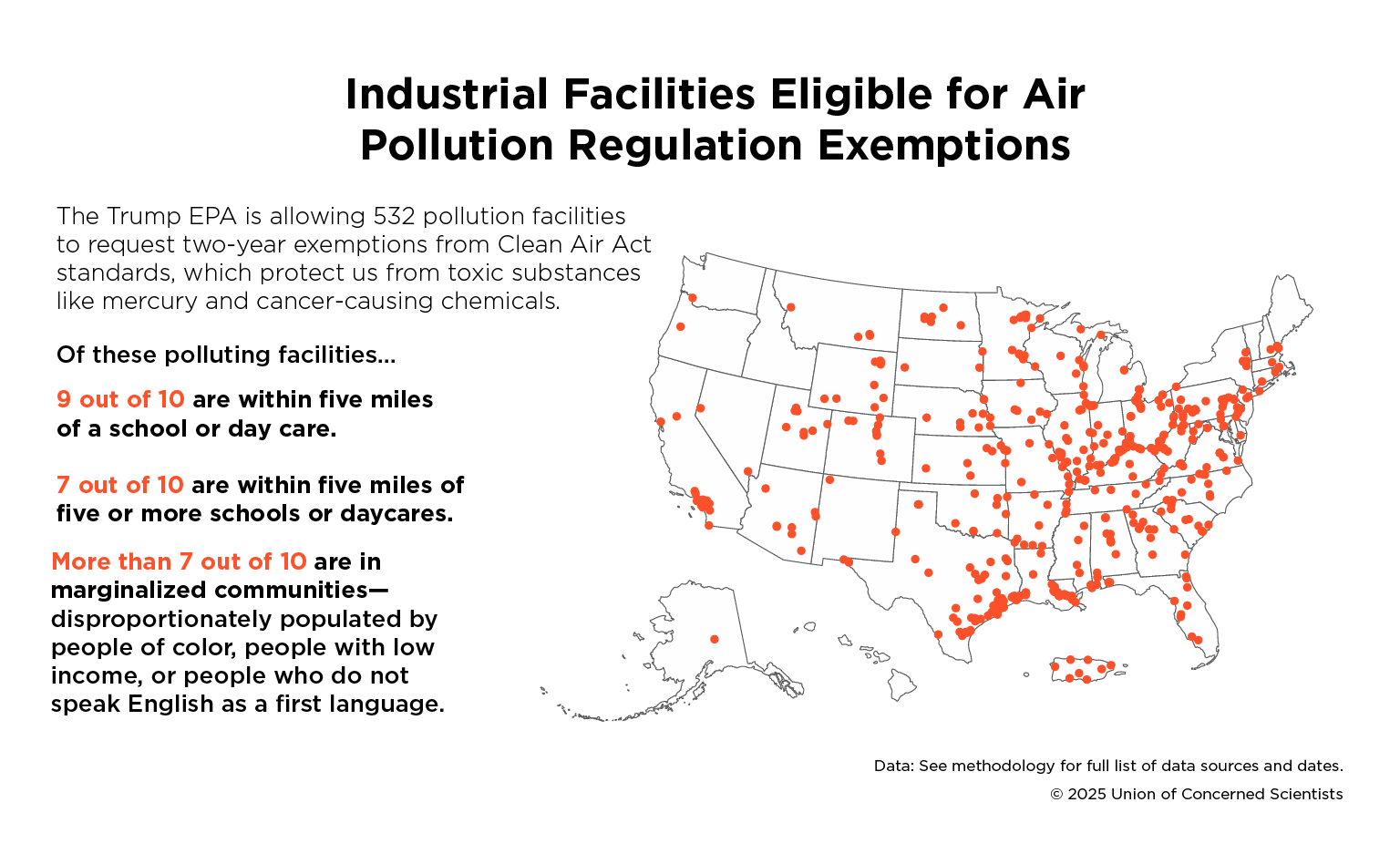
**Data sources: Environmental Defense Fund; US Census Bureau 2022 American Community Survey.
Union of Concerned Scientists
Read More: Ignoring Public Input
At its most basic level, a healthy democracy is a government system responsive and accountable to the people. Public participation, including the ability of all people to have equal access and influence in government decisionmaking, is not only fundamental to functioning democratic processes, but also required by law. For example, under the Administrative Procedure Act—one of the key statutes that dictates how our government operates—agencies are required to notify the public about proposed regulations, allow people and organizations to submit comments with their feedback, and respond to the substance of those comments. When the people most affected by government policies and programs can access and weigh in on those processes, our nation's policies are more effective and conditions improve for the public.
While there are always ongoing threats to public participation in government, such as corporate lobbyists having undue influence on lawmaking, the Trump administration is openly calling on federal agencies to blatantly ignore public input to government decisions that affect people's lives. In addition to rescinding guidance proposed by the Biden administration to enhance meaningful participation in government decisionmaking, the Trump administration issued executive order 14219,which attempts to give DOGE the authority to pick and choose which regulations can be eliminated—regardless of what public benefits they provide or whether there was strong public support for these regulations. The executive order also tells federal agencies to not enforce regulations unaligned with the administration's priorities. Furthermore, the White House urged agencies to repeal regulations "without notice and comment," effectively ignoring public comments from scientists, affected communities, and other stakeholders. This is one of several executive orders and actions that aim to weaken our public safeguards.
For example, in March, the White House Council on Environmental Quality (CEQ) eliminated regulations implementing the National Environmental Policy Act (NEPA)—one of our nation's cornerstone environmental laws—and later removed the NEPA guidance on climate change. NEPA requires any federal agency undertaking an action or project with significant environmental impacts—such as a highway expansion or demolishing a building—to consider alternatives and invite input from people who will be affected before initiating the project. NEPA is also a critical tool for ensuring major projects' environmental and public health harms, including cumulative impacts (the combined environmental and social stressors), are considered and accounted for. The first Trump administration sought to weaken NEPA, an effort the Biden administration reversed. Now, during President Trump's second term, his administration bypassed public comment altogether, issuing an "interim final" rollback of the regulations that implement NEPA. The administration eliminated the regulations before public comments were considered, and CEQ states it will not reconsider the decision regardless of what comments are submitted. Even more, CEQ also issued guidance eliminating requirements to consider cumulative impacts and proposed projects' impacts on nearby communities. Therefore, not only did CEQ eliminate NEPA regulations without public input, but also it removed the processes within NEPA that require proposed projects to consider public input. The message from the Trump administration is clear: your expertise, your life experience, and the impacts that this action will have on you do not matter.
In addition to executive orders issued by the White House, other actions across the federal government are impeding the public's ability to engage in government decisionmaking. For example, federal employees who compile and then provide the public with government records requested under the Freedom of Information Act (FOIA) have been cut. Certain federal agencies are also taking unilateral actions to limit public participation. For example, HHS rescinded a 1971 policy that required public notice and comment for regulations related to public benefit programs such as Medicaid and Medicare.
While the Trump administration cuts the US population out of public processes, it is expanding deregulatory actions that benefit corporations. In March, EPA announced that companies subject to certain Clean Air Act regulations could request a "Presidential Exemption" from air pollution controls for up to two years by sending an email, purportedly leaving the decision up to President Trump himself. This is a flagrant and unprecedented abuse of power. This not only would give the US president authority to grant compliance exemptions on agency regulations, but also would completely ignore the regulatory process, tens of thousands of public comments, and countless hours of federal employee time that went into developing and finalizing these regulations. In addition to these two-year compliance exemptions, the EPA has already begun reconsidering these regulations altogether, which could take them off the books entirely.
The exemption applies to nine air pollution regulations, including ones that regulate power plants that emit mercury, an extremely hazardous toxicant that can cause lifelong neurological impairments, particularly when exposures are in utero, to babies, and to children. It also applies to facilities that emit ethylene oxide, a cancer-causing gas used in chemical manufacturing and medical device sterilization. More than 530 facilities across the United States are regulated under these rules and could apply for this exemption simply by sending an email. Several advocacy groups have argued that these exemptions are illegal.
As shown in Figure 4, a UCS analysis found that unregulated pollution from these 532 facilities would disproportionately harm communities of color, communities with low income, and people who do not speak English as a first language. We also found 90 percent of these facilities are within five miles of a school or day care, presenting potential danger to children, who are more susceptible to the harms of air toxics exposure. Furthermore, 60 percent of these facilities are located in the communities most polluted by air toxics nationwide. Allowing these facilities to evade pollution regulations compounds health harms that already exist in predominantly lower-income and in Black, Brown, and Indigenous communities nationwide.
4. Cutting Out Independent Experts
Federal advisory committees (FACs) are crucial for providing expert independent guidance to the US government on policy decisions. These committees, including more than 200 focused on science and technology, help ensure that policies are based on robust evidence and protected from undue political influence. Similar to during President Trump's first term, his administration is undermining and dismantling FACs. UCS found that 51 (27 percent) of active science FACs have been terminated or disbanded. Science FACs at the Department of Health and Human Services (23), National Science Foundation (8), Department of Agriculture (4), and Environmental Protection Agency (3) have seen the most disruptions. These disruptions include dismissing existing scientist members, delaying meetings, and even threatening termination for additional committees. FACs are a critical component of ensuring science and the lived and professional experience of a diverse group of experts is represented in government policy, and undermining their ability to meet and provide guidance will hurt real people.
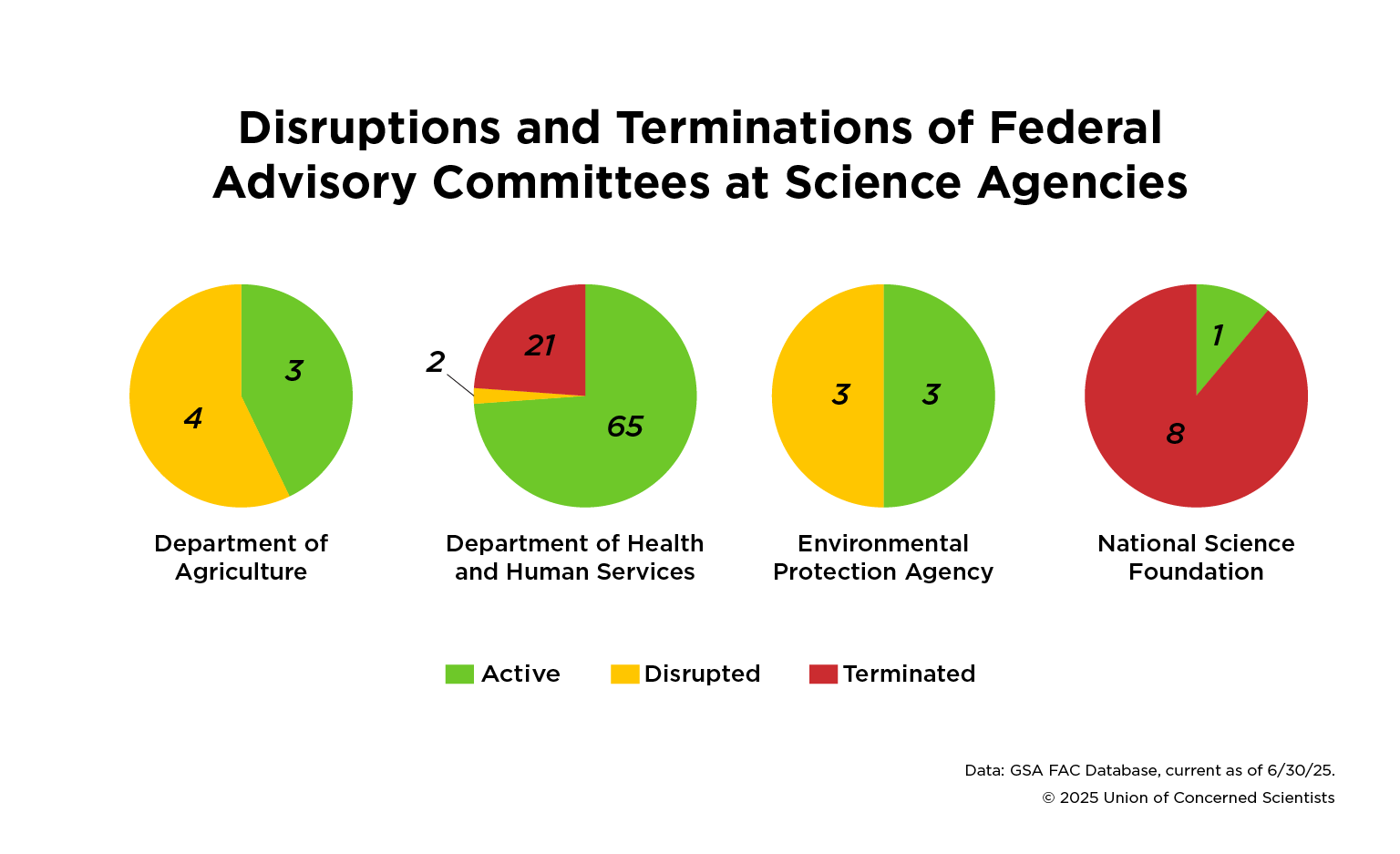
**Terminations include administrative inactivity and dismissal citing executive order 14217. Disruptions include removal of members, cancellations, or marked delays (longer than one month) of scheduled meetings. Data source: GSA FAC DatabaseNBC News. Data last updated on June 30, 2025.
Union of Concerned Scientists
Read More: Cutting Out Independent Experts
Federal advisory committees are groups of experts who provide their knowledge and consultation to the federal government in policy- and decisionmaking. In a tradition that started with George Washington, experts across sectors (academia, local or tribal governments, and non- and for-profits) provide guidance based on the best available science, evidence, and lived experiences to policymakers on relevant issues and regulations that affect real people. There are FACs whose purpose is to give recommendations on the topics of environmental justice, child health, and local government perspectives, to name a few examples. Under the Federal Advisory Committee Act, or FACA, many FACs are created and protected by Congress and must meet certain requirements in their membership composition and meeting frequency.
Out of roughly 1,000 FACs in the federal government, 208 specialize in science or technical topics. These science advisory committees provide government agencies with scientific information and recommendations on topics ranging from aging and vaccines to air pollution. Including independent experts in the conversation on how best to protect the health and safety of the US public is an important and crucial way to build effective, science-driven policy—and also a way to make efficient use of government resources given that agencies can call on volunteers and/or pay for a few days of experts' time instead of hiring employees having the necessary expertise. Additionally, science FACs help safeguard regulations, policies, and guidance from corporate or political interference by solidifying the inclusion of the best available science in these processes.
Unfortunately, FACs, including numerous science FACs, are currently under attack by the Trump administration. In his second term, President Trump reinstated executive order 13875, which requires at least one-third of FACs across the government to be dissolved. A previous UCS analysis found that during President Trump's first term, there was a clear pattern of dismantling, dismissing, and delaying FAC meetings and members, all actions that sideline science in government policy- and decisionmaking. Our new analysis shows similar efforts taking place in President Trump's second term.
Of the 208 FACs classified as "scientific technical program advisory boards" in the FAC database, 188 were "administratively active" when President Trump returned to office on January 20, meaning that they had members and were actively meeting in line with an approved charter. As of June 30, 51 (27 percent) of active science FACs have been terminated or disbanded. Of the remaining 137, 18 are currently being considered for termination by HHS, 3 are in the process of removing scientific experts and inviting new members with unknown qualifications, and 3 have had their scheduled meetings canceled or markedly delayed.
As shown in Figure 5, the agencies with the most interruptions to their science FACs are HHS (23), NSF (8), USDA (4), and EPA (3). These changes result in a near or, in some cases, total elimination of science FACs in NSF, EPA, the US Agency for International Development (which was dismantled altogether), the Department of Labor, and the Consumer Financial Protection Bureau. Of note, changes in meeting frequency, member composition, and FAC terminations are not fully updated in the FAC database until the end of the current fiscal year, meaning these numbers are most likely an underestimate of the changes undertaken by the Trump administration.
Soon after the inauguration, EPA FACs such as the Clean Air Scientific Advisory Committee and Science Advisory Board—which provide the agency with scientific expertise on air pollution regulations and review scientific information used by the agency, respectively—were "reset," meaning the existing scientist members were dismissed. The Advisory Committee on Immunization Practices (ACIP), which advises CDC on vaccine safety and immunization schedules, initially saw its meetings delayed for weeks, which impacted its ability to make timely recommendations for time-sensitive public health issues such as the annual flu season. In June, all members of ACIP were removed altogether and replaced with members with conflicts of interest on the record. And in line with executive order 13875, many FACs, like those at the Census Bureau that provide guidance on developing and distributing census surveys, have been disbanded. It is now unclear how the Bureau will incorporate data analysis best practices and ensure appropriate representation of historically underrepresented groups in the upcoming decennial US Census. FACs are a critical component of ensuring science and the lived and professional experience of a diverse group of experts is represented in government policy, and undermining their ability to meet and provide guidance will hurt real people.
5. Censoring and Suppressing Scientific Information
The Trump administration is systematically attacking public access to government information. Thousands of federal webpages and databases, many containing critical science-based data (such as EJSCREEN and the Climate and Economic Justice Screening Tool), have been eliminated or altered. This unprecedented scale of information removal stems partly from executive orders targeting DEI and environmental justice programs. Between January 20 and June 30, 2025, there have been at least 847 substantive changes to environmental and climate government webpages, including removal of webpages altogether and censoring terms such as "climate change." Beyond removal, the administration is withholding science-based information, especially on public health issues, that does not align with its political ideology.
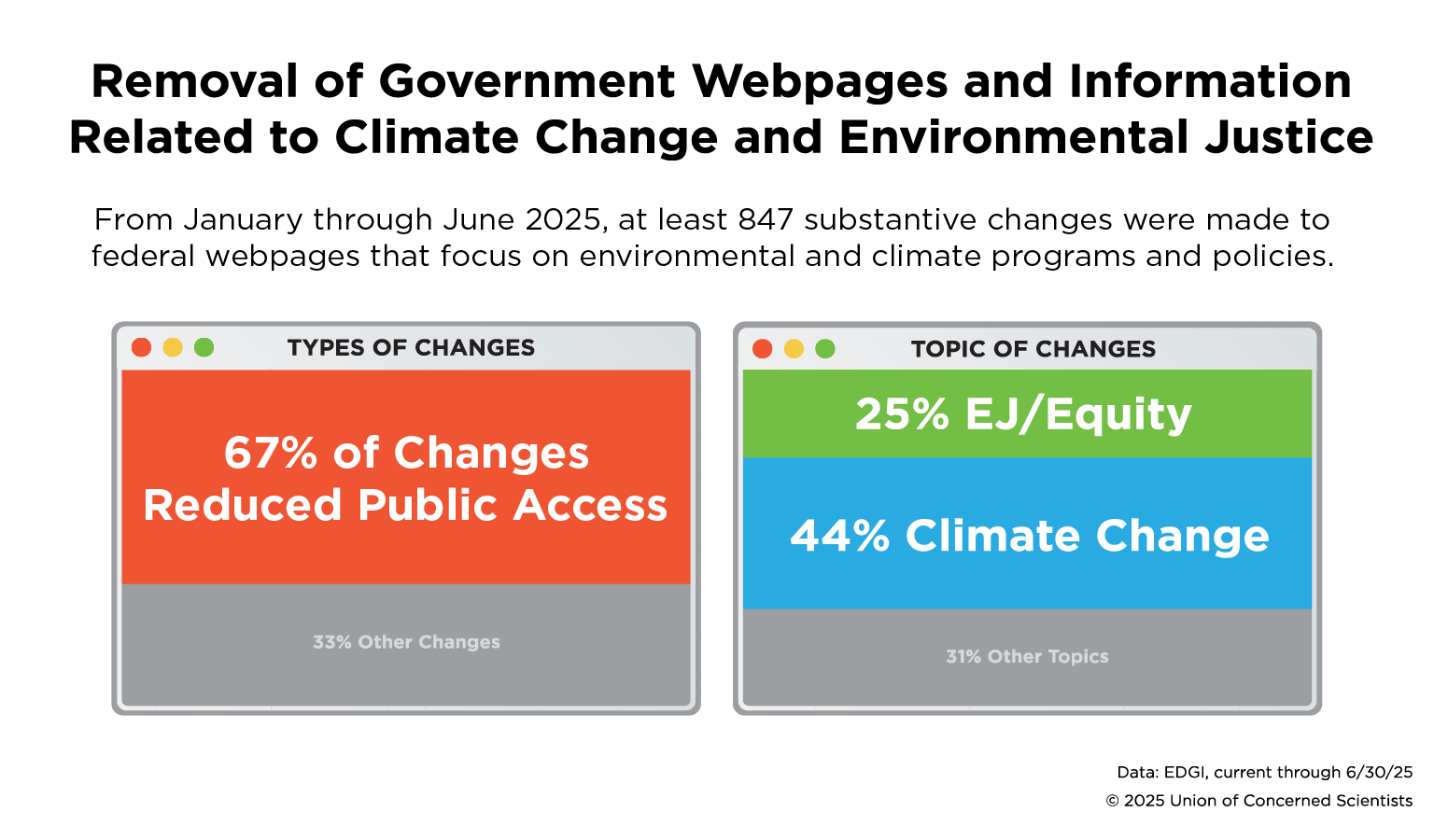
**Data source: Environmental Data and Governance Initiative. Data last updated on June 30, 2025.
Union of Concerned Scientists
Read More: Censoring and Suppressing Scientific Information
One of the core functions of the US government is providing the public with free access to information, especially information related to government policies and programs. The public's right to this information is enshrined in the FOIA and other administrative laws that dictate how our government operates. In recent decades, bipartisan efforts were made to expand online access to government information, including federally funded scientific research design and results. These efforts were aimed at ensuring that datasets and scientific reports can be read and downloaded and that government webpages are archived between presidential administrations. Government data, such as the US Census, are not only critical for informing how the government designs and distributes programs and resources; they are also used by academics, legislators, state and local regulators, industry, and the broader public.
The public's fundamental right to this information is currently under attack. The Trump administration has systematically eliminated thousands of government webpages and databases, many of which included critical science-based information, and halted certain government data collection efforts. Although some level of information turnover is expected between presidential administrations, the sheer scale of elimination and distortion of information is unprecedented, even compared to President Trump's first term. These actions originated, in part, from executive order 14151, which directs federal agencies to terminate all programs and activities related to DEI and environmental justice, as well as executive order 14168, which directs federal agencies to recognize only male and female sexes in government documents and websites, plainly attacking intersex, transgender, and gender-fluid people. These politically motivated attacks resulted in thousands of government webpages being taken down, including health guidance for pregnant people and surveys on health disparities among LGBTQ+ youth. Language related to climate and clean energy has also been deleted from federal webpages. In addition, the administration removed a slew of public datasets, including EJSCREEN and the Climate and Economic Justice Screening Tool (CEJST), that show how different inequities, including low income, pollution exposure, and chronic disease disproportionately affect communities across the country. In April, UCS sued several government agencies for illegally removing EJSCREEN, CEJST, and other critical datasets that were funded by taxpayer dollars and that the public has a legal right to access.
The Environmental Data and Governance Initiative (EDGI) has been monitoring 4,429 federal webpages related to environmental and climate programs and policies. As shown in Figure 6, between January 20 and June 30, 2025, EDGI documented 847 substantive changes across those webpages. Roughly two-thirds (67%) involved reducing information access, including the removal of at least 176 government webpages altogether. EDGI also documented instances of politicized terms being replaced on government webpages, such as changing "climate change" to "future risks" or "extreme weather" on certain EPA and Federal Emergency Management Agency (FEMA) webpages. Of the environmental webpages EDGI monitored, most of the changes were related to climate change (44 percent) and environmental justice or equity (25 percent).
There are ongoing public efforts to preserve and restore access to these webpages and tools. But, concurrently, the administration's widespread elimination of government information is happening amid mass firings, including of government employees responsible for ensuring public access to information, and amid efforts to gut scientific expertise, silence scientists, and halt government-funded scientific research. For example, a leading nutrition scientist at the NIH left the agency due to concerns over political interference and suppression of his groundbreaking research on ultraprocessed foods.
One clear and troubling example of the negative effect of the suppression of science-based information concerns the ongoing measles outbreak. This is the worst measles outbreak in over three decades. As of July 8, 2025, there were more than 1,200 confirmed cases nationwide. At least three people have died—two of them children, all unvaccinated for measles. Yet, Robert F. Kennedy Jr., the unqualified secretary of HHS—our nation's leading public health agency—has disinvested from vaccine hesitancy research, propped up disproven links between autism and vaccines, pushed out federal scientists, appointed discredited researchers to leadership positions, and promoted unproven treatments that put kids in the hospital. Amid the flurry of disinformation, a ProPublica investigation revealed that political interference prevented the release of a CDC assessment that found the risk of catching measles is high in areas with lower vaccination rates. This is scientific censorship. By suppressing evidence-based information that may promote measles vaccine uptake, Kennedy is able to continue sowing doubt about vaccines, threatening to accelerate current declines in measles vaccination rates among US children. Research shows that at current vaccination rates, the United States could experience 851,300 cases of measles over the next 25 years, but if vaccination rates decline another 10 percent, then we could see more than 11 million cases, highlighting the life-and-death stakes posed by continued erosion of public trust in vaccine science.
Case Study: Attacking Climate Science and Policies to Benefit Fossil Fuel Companies
The Trump administration has launched a widespread assault on climate science, policies, and investments. It has prioritized fossil fuel interests despite indisputable scientific evidence of the causes and effects of climate change and already devastating climate impacts. So far, the administration has announced or implemented 194 actions threatening climate and clean energy progress. Climate change-related work at federal agencies such as the Environmental Protection Agency, Department of Energy, Federal Emergency Management Agency, and National Oceanic and Atmospheric Administration has been particularly targeted. This systematic effort to suppress climate science and dismantle actions to address the climate crisis will increase costs and suffering, particularly for disadvantaged communities, while boosting fossil fuel pollution and profits.
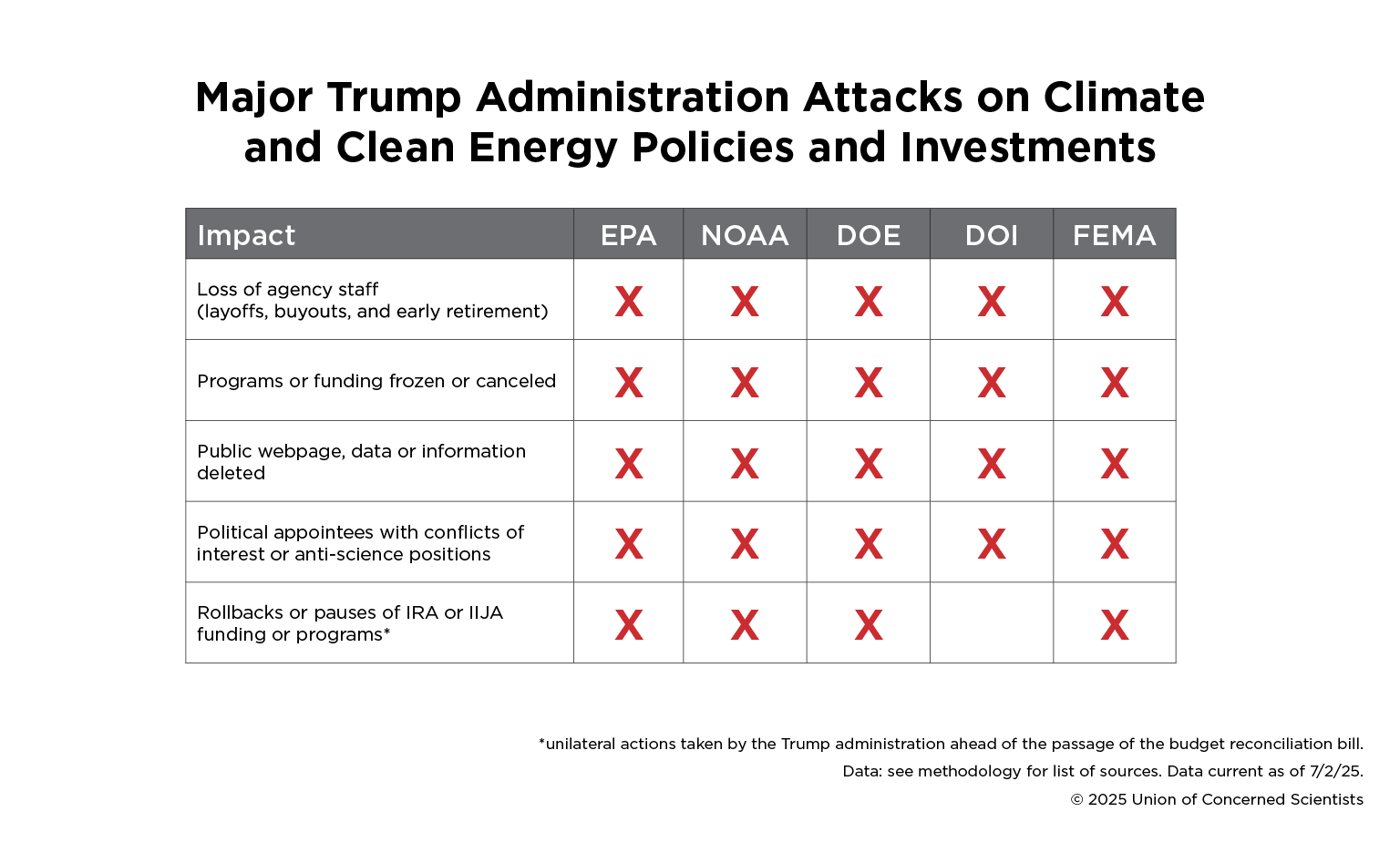
**Data source: See methodology. Data last updated on July 2, 2025.
Union of Concerned Scientists
Read More: Attacking Climate Science and Policies to Benefit Fossil Fuel Companies
The Trump administration's widespread assault on science has included a concentrated attack on anything to do with climate change. The administration has made clear its deep-seated hostility to climate science and intent to roll back climate action to benefit deep-pocketed fossil fuel interests. This anti-climate agenda flies in the face of decades worth of increasingly sobering scientific studies, data, people's real-life experience of catastrophic climate impacts, and mounting economic toll—all of which underscore the urgency of addressing the climate crisis.
President Trump has withdrawn the United States from the Paris Agreement; thrown the Sixth National Climate Assessment into jeopardy and taken down the US Global Change Research Program's website, which includes all previous National Climate Assessments; halted US federal scientists' engagement with the Intergovernmental Panel on Climate Change; failed to release the annual US Greenhouse Gas Inventory; and stopped updating data on billion-dollar weather and climate disasters.
EPA administrator Lee Zeldin has launched an all-out assault on regulations, guidance, and scientific research designed to protect public health and the environment. Targets of this assault include power plant carbon regulations, greenhouse gas standards for vehicles, oil and gas methane regulations, the social cost of carbon metric (widely accepted as a measure of the monetary costs of climate damages caused by an additional ton of carbon emissions), and mandatory reporting of heat-trapping emissions. President Trump has also worked with Congress to block California's long-standing ability to set stronger air pollution standards under the Clean Air Act.
At President Trump's directive, Zeldin has also initiated a process to "reconsider" EPA's bedrock 2009 Endangerment Finding, thescientific determination that heat-trapping emissions harm human health and welfare. It provides a legal basis for EPA's authority and obligation to set standards to limit global warming pollution from sources such as vehicles, power plants, and oil and gas operations, following from the 2007 US Supreme Court Massachusetts v. EPA decision. The latest climate science is even more compelling and dire, underscoring that climate change is already causing significant harm to people's health and well-being and that those harms will worsen as emissions rise. Weakening or overturning the Endangerment Finding at the behest of fossil fuel interests would recklessly go against established science and is a strategy to evade EPA's responsibility to help limit the dangerous, costly impacts of climate change.
The administration has illegally frozen and attempted to claw back funding for climate and clean energy investments, such as the Greenhouse Gas Reduction Fund, while attempting to boost coal, oil, and gas use under the guise of a spurious "national energy emergency." DOE secretary Chris Wright and Department of Interior secretary Doug Burgum—both with deep fossil fuel industry ties—have aggressively embraced the president's fossil fuel agenda in defiance of the science showing an urgent need to transition to clean energy. Wright has repeatedly attacked clean energy, rolled back energy efficiency standards, overseen mass staff cuts at the agency, and spouted anti-science rhetoric about global warming. Burgum's actions have included expanding oil and gas leases on public lands, rescinding requirements for environmental impact statements, fast-tracking permits for fossil fuel energy, and arbitrarily pausing offshore wind projects.
The administration has also taken actions that will leave communities less prepared and more at risk from worsening climate impacts, including rescinding the science-informed federal flood risk management standard; causing the loss of at least 2,000 experienced FEMA staff through, layoffs, buyouts, and early retirement; eliminating FEMA's Building Resilient Infrastructure and Communities and Flood Mitigation Assistance grant programs; disbanding expert advisory councils and installing a politicized FEMA Review Council; politicizing approvals of disaster aid; and threatening to completely shift the burden of disaster response to states and even to abolish FEMA.
NOAA, the nation's foremost climate science agency, has faced reckless firing of staff, budget cuts, and slashed resources for climate research, satellite programs, data, and modeling. Under Department of Commerce secretary Howard Lutnick's watch, the agency's weather forecasting and climate monitoring capabilities are being undermined and many National Weather Service offices are dangerously understaffed—undercutting critical resources that communities, first responders, farmers, mariners, businesses, and local decisionmakers rely on to protect lives, infrastructure, and economic activity. Critical NOAA data and tools are also being discontinued, including snow and ice data products and climate.gov, a free public portal for essential information on climate science and impacts.
These harmful cuts to NOAA and FEMA come even as the nation is facing another summer Danger Season, when communities across the U.S. tend to experience the worst climate-fueled disasters including heatwaves, hurricanes, wildfires, and floods.
Disinformation and lies about climate science do not change the facts: heat-trapping emissions primarily from burning fossil fuels are driving worsening climate impacts. But trying to bury and erode the evidence is one more way the administration is seeking to evade their responsibility to set policies to limit emissions, thus serving the goals of fossil fuel companies. Without urgent action, the US economy and people will face growing costs and suffering, especially those in communities already overburdened by fossil fuel pollution and on the frontlines of climate-fueled disasters.
As shown in Figure 7, the Trump administration has taken numerous actions to undermine or attack climate and clean energy progress, including by slashing agency budgets, staffing and programs and installing anti-science, pro-fossil fuel agency heads. According to the New York Times, in its first 100 days, the Trump administration announced or implemented at least 43 major actions threatening climate, clean energy, and environmental justice policies and investments. The Sabin Center's Climate Backtracker shows that, as of July 2, 2025, the Trump administration has taken 194 actions to scale back or halt climate and clean energy progress. Federal agencies focused on issues related to climate and energy, such as EPA, DOE, NOAA and FEMA, made up the bulk of the focus of these attacks.
Profits Over People
The totality of the Trump administration's destructive actions may not be fully known for months, or even years, to come. These sweeping cuts to the federal scientific workforce, funding, and regulatory protections have already harmed communities across the country, and the economic and human impacts will unfortunately grow. Civil servants dedicated to ensuring that government decisionmaking is guided by the best available science have had their careers and livelihoods ripped from under them; academic and independent researchers no longer have funding for life-changing biomedical research; and communities that have spent decades advocating for clean air and water have been told that the government will no longer enforce regulations.
When scientific evidence, including people's lived experience, no longer matters in government decisionmaking and policies, who wins? The Trump administration's actions clearly and deliberately sacrifice the health of communities in favor of billionaires and corporations. Without government scientists evaluating regulatory decisions to prioritize the public's interests, corporations and profit-motivated actors can more easily influence policymaking. Without government-funded research, basic science and early-stage research will suffer, as will private innovation that relies on it. Scientific inquiry can be privatized, allowing profit-motivated actors to forego research that can improve health outcomes for marginalized communities if they do not think it will boost their bottom line. And without the environmental and public health regulations that hold polluters accountable, corporations can maximize their profits at the expense of people and our planet's health and well-being. All these actions benefit billionaires and corporations, while directly harming the US public, especially low-income, Black, Brown, and Indigenous communities, and the economy. The Trump administration is not "making America great." It is widening health and economic disparities, eroding trust in science, and butchering our democratic systems.
Recommendations and Resources
Lawmakers can sponsor and champion policies that enshrine and protect the use of science in government decisionmaking and for the public good, and they can hold political leaders accountable to the people of the United States. Lawmakers and other decisionmakers should take the following actions:
-
Support the Scientific Integrity Act (SI Act). This legislation would require federal agencies that fund or oversee public science to establish and uphold clear scientific integrity principles. It formalizes these policies and reinforces them with the force of law, ensuring that science, not politics, ideology, or financial conflicts of interest, guides policy decisions. The SI Act also holds public scientists to the highest professional standards while safeguarding their rights and protections under the law. UCS is leading efforts to mobilize support through sign-on letters and meeting with lawmakers across the aisle to gather additional co-sponsors for the bill.
-
Support the EXPERTS Act (formerly known as the Stop Corporate Capture Act). This legislation, expected to be introduced this summer, aims to prevent industry influence over regulatory agencies by increasing transparency in federal rulemaking by requiring disclosure of study funding. It also restores the practice of courts deferring to agencies' expertise when laws are written in general terms, which was the norm until the Supreme Court overturned it with the Loper Bright Enterprises v. Raimondo case in 2024. The bill creates an Office of the Public Advocate, imposes penalties for false comments by public companies, and allows reinstatement of rules rescinded through the Congressional Review Act within one year.
-
Support the Whistleblower Protection Act. This legislation would shield federal employees from retaliation, including termination in some cases, when they report government misconduct information to Congress and would extend protections to some federal employees who are not covered under current law.
-
Oppose the Regulations from the Executive in Need of Scrutiny (REINS) Act. This legislation would require congressional approval of all major regulations issued by federal agencies before those regulations could go into effect, thereby politicizing decisions that should be based on science and public need. UCS has joined efforts led by our partners to oppose this bill.
-
Pass legislation to explicitly prohibit the implementation of Schedule Policy/Career (formerly Schedule F) or similar efforts to politicize the civil service, to protect independent federal scientists and career civil servants from arbitrary dismissal based on political ideology.
-
Rebuild and modernize FACs to operate free of political interference and neglect, and ensure they are composed of diverse, independent experts who do not have conflicts of interest, recognizing that holding federal research grants does not constitute a conflict. You can learn more about attacks on FACs at the UCS blog, The Equation, and also check out our new toolkit to support independent scientists who want to run their own advisory committees.
-
Challenge efforts that omit public participation in governance and ensure fair access to legislative and regulatory decisions that impact the US public.
-
Ensure that policies and regulations are informed by the best available science and that they are fairly implemented and robustly enforced.
-
Protect and prioritize funding for federal science, as well as external federal research grants, such as via NIH and NSF, to ensure continued innovation and a strong scientific enterprise that is invaluable for the economy, health, and well-being of the US public.
-
Restore public access to government data, including key climate and health data that government decisionmakers, scientists, businesses, and other stakeholders rely on. UCS has archived a number of government documents related to science and environmental justice, and sued several government agencies to restore access to critical environmental and climate tools.
Scientists, advocates, and members of the public can also support efforts to safeguard federal science and scientists through the following actions:
-
Call on Congress to do its job and safeguard federal agencies, science, and expertise that provide huge benefits to the public. This includes contacting your lawmakers to ask that they support the Scientific Integrity Act, EXPERTS Act, and Whistleblower Protection Act.
-
Use and share the UCS Resources for Federal Scientists, Resources for Participating in Federal Rulemaking, and How-To Guide for Running an Independent Science Advisory Committee.
-
Join the UCS Science Network, which can also connect you to local efforts to defend science in your community.
Authors
Darya Minovi is a senior analyst for the Center for Science and Democracy at UCS. Kristie Ellickson is a senior scientist for the Center. Jules Barbati-Dajches is an analyst for the Center. Rachel Cleetus is senior policy director for the Climate and Energy Program at UCS.
Acknowledgments
This analysis was made possible by the generous support of the Bernard F. and Alva B. Gimbel Foundation, Democracy Fund, and UCS members.
The authors would like to thank Natalie Gehred, Avery Kaplan, and Alexander Choiniere for their contributions to the data analyses; Jennifer Jones, Julie McNamara, James Goodwin, Liz Borkowski, Tom Sinks, Joseph Reed, and Lisa Van Theemsche for their thoughtful review and input; and Matt Heid, Seth Michaels, Lana Cohen, Bryan Wadsworth, Leslie Brunetta, Cynthia DeRocco, Ryan Fleischer, and Omari Spears for editing and production.
The opinions expressed herein do not necessarily reflect those of the organizations that funded the work or the individuals who reviewed it. The Union of Concerned Scientists bears sole responsibility for the report's contents.
Downloads
Citation
Minovi, Darya, Jules Barbati-Dajches, Rachel Cleetus, and Kristie Ellickson. Science and Democracy Under Siege: Documenting Six Months of the Trump Administration’s Destructive Actions. Cambridge, MA: Union of Concerned Scientists. https://www.ucs.org/resources/science-and-democracy-under-siege
